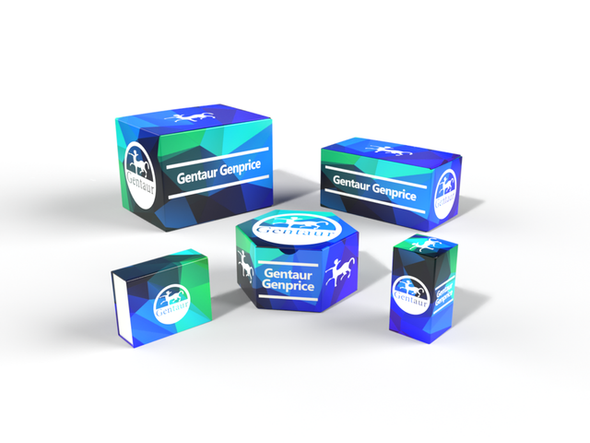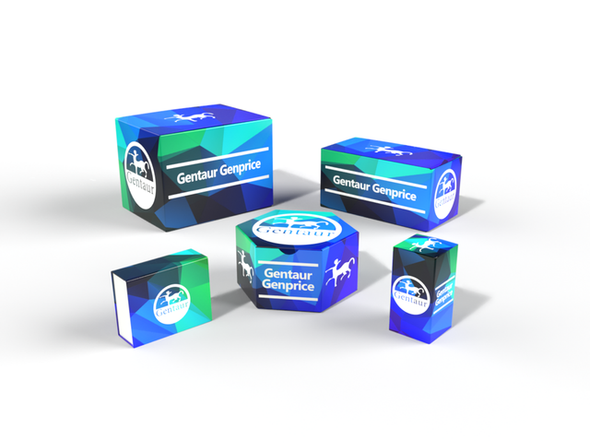Description
Phosphotyrosine Antibody [PY20] (FITC) | 98-514 | Gentaur UK, US & Europe Distribution
Host: Mouse
Reactivity: N/A
Homology: N/A
Immunogen: Phosphotyrosine conjugated to carrier proteins
Research Area: Obesity, Signal Transduction, Neuroscience, Cancer
Tested Application: E
Application: Phosphotyrosine Antibody [PY20] for use in immunohistochemistry / immunocytochemistry, flow cytometry, and western blotting assays.
Specificiy: Phosphotyrosine
Positive Control 1: N/A
Positive Control 2: N/A
Positive Control 3: N/A
Positive Control 4: N/A
Positive Control 5: N/A
Positive Control 6: N/A
Molecular Weight: N/A
Validation: N/A
Isoform: N/A
Purification: N/A
Clonality: Monoclonal
Clone: [PY20]
Isotype: IgG2b
Conjugate: FITC
Physical State: Liquid
Buffer: Supplied in PBS/NaN3
Concentration: 0.5 mg/mL
Storage Condition: Store vial at 2-8˚C
Alternate Name: pTyr20
User Note: Optimal dilutions for each application to be determined by the researcher.
BACKGROUND: Protein tyrosine residues are phosphorylated as a result of intracellular protein kinase activation (e.g., via growth factors) during normal growth and development and in oncogenesis. The most abundant population of target proteins for tyrosine phosphorylation is cell surface glycoproteins. Antibodies to phosphotyrosine enable the detection, isolation, and characterization of proteins containing phosphotyrosine. The monoclonal antibody PY20 prevents internalization of activated receptors (e.g., EGFR) when microinjected into cells. The affinity of PY20 for phosphotyrosine is approximately 10-6 to 10-7 M. PY20 binding to phosphorylated tyrosines can be inhibited by free phosphotyrosine and phenylphosphate but not by phosphoserine, phosphothreonine, or free phosphate.

![Phosphotyrosine Antibody [PY20] (FITC) Phosphotyrosine Antibody [PY20] (FITC)](https://cdn11.bigcommerce.com/s-1rdwiq712m/images/stencil/608x608/products/484837/490666/gentaur-genprice__26005.1661610467__29809.1661628092__75433.1661676199__77988.1661684280__64362.1661692443__02085.1662049603__45075.1662119302__91744.1662191540__21580.1662291419__37625.1663498935.png?c=1)
![Phosphotyrosine Antibody [PY20] Phosphotyrosine Antibody [PY20]](https://cdn11.bigcommerce.com/s-1rdwiq712m/images/stencil/590x590/products/484836/490665/gentaur-genprice__26005.1661610467__29809.1661628092__75433.1661676199__77988.1661684280__64362.1661692443__02085.1662049603__45075.1662119302__91744.1662191540__21580.1662291419__67006.1663498935.png?c=1)
![Phosphotyrosine Antibody [PY20] (PE) Phosphotyrosine Antibody [PY20] (PE)](https://cdn11.bigcommerce.com/s-1rdwiq712m/images/stencil/590x590/products/484399/490228/gentaur-genprice__26005.1661610467__29809.1661628092__75433.1661676199__77988.1661684280__64362.1661692443__02085.1662049603__45075.1662119302__91744.1662191540__21580.1662291419__02882.1663498864.png?c=1)
![Phosphotyrosine Antibody [PY20] (Biotin) Phosphotyrosine Antibody [PY20] (Biotin)](https://cdn11.bigcommerce.com/s-1rdwiq712m/images/stencil/590x590/products/484838/490667/gentaur-genprice__26005.1661610467__29809.1661628092__75433.1661676199__77988.1661684280__64362.1661692443__02085.1662049603__45075.1662119302__91744.1662191540__21580.1662291419__66549.1663498935.png?c=1)
![Phosphotyrosine Antibody [PY20] (HRP) Phosphotyrosine Antibody [PY20] (HRP)](https://cdn11.bigcommerce.com/s-1rdwiq712m/images/stencil/590x590/products/485428/491257/gentaur-genprice__26005.1661610467__29809.1661628092__75433.1661676199__77988.1661684280__64362.1661692443__02085.1662049603__45075.1662119302__91744.1662191540__21580.1662291419__14075.1663499030.png?c=1)
![Phosphotyrosine Antibody [PY20] (Alkaline Phosphatase) Phosphotyrosine Antibody [PY20] (Alkaline Phosphatase)](https://cdn11.bigcommerce.com/s-1rdwiq712m/images/stencil/590x590/products/485427/491256/gentaur-genprice__26005.1661610467__29809.1661628092__75433.1661676199__77988.1661684280__64362.1661692443__02085.1662049603__45075.1662119302__91744.1662191540__21580.1662291419__43101.1663499030.png?c=1)
![Phosphotyrosine Antibody [PY20] Phosphotyrosine Antibody [PY20]](https://cdn11.bigcommerce.com/s-1rdwiq712m/images/stencil/590x590/products/483535/489364/gentaur-genprice__26005.1661610467__29809.1661628092__75433.1661676199__77988.1661684280__64362.1661692443__02085.1662049603__45075.1662119302__91744.1662191540__21580.1662291419__67430.1663498729.png?c=1)


